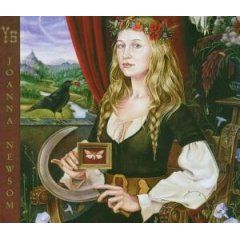
With a couple of high-profile collaborations and an inspiringly ambitious approach to composition, Joanna Newsom has delivered 2006’s record most likely to make you imagine you’re listening to it live…in the woods…sitting on a tree stump…with various musicians clinging to branches and strewn about the shrubs around you.
On paper, it is tempting to consider Ys a “difficult” album. There are five songs, and they add up to a total of 55 minutes. Ys is a mythical city that was flooded, perhaps by Satan. The loose concept, however, is based on events that occurred in the past year of Ms. Newsom’s life, so unless you know her personally, you will probably have trouble deciphering the intended meaning of the semi-cryptic yrics. The instrumentation is unconventional as well. Much like 2004’s Milk-Eyed Mender, the songwriting is based around harp and vocals (although this time orchestral accompaniment has been added), and she is still a rather idiosyncratic singer, although less so here than on the debut.
One of the more remarkable aspects of Ys is that despite all of the above, it is simply not a demanding listen. The songs develop appropriately, and each new idea is introduced in a tasteful and timely fashion. By using inventive, infectious melodic ideas to keep the compositions moving, Newsom constructs large-scale thematic arcs while giving each passage its own personality. The ‘meteorite’ refrain in “Emily,” for example, is harmonically alluded to in several of the preceding sections. Meticulously crafted devices like this are all over the album. The result is a fluid listening experience, as its unwavering depth politely demands your undivided attention.
Lyrically, she has expanded on the poetic deftness that was established on her first record. Although it can be daunting to grasp the esoteric themes and use of archaic vocabulary at times, the writing stretches out impressively. She conjures vibrant images that resonate against the music, and the short stories are intriguing on their own, even if their connection to the rest of the album is somewhat nebulous. Perhaps the most lyrically direct song, “Monkey & Bear” is a nine-minute narrative about a monkey and a bear (tricky, I know) who escape from a farm. Upon finding freedom, the monkey coerces the bear to dance for money to ensure their subsistence. The bear starts to wander occasionally, the monkey becomes embittered, and chaos ensues. It’s brilliant. The following solo piece, “Sawdust & Diamonds,” is rife with metaphysical references (doves, bells tolling, and “a sandcastle that the gibbering wave takes”), a motif that comes up in most of the songs.
Van Dyke Parks’ contribution plays a vital role in executing Newsom’s vision. The strings swell and subside exactly as they should. When “Cosmia” surges toward its intense conclusion, they patiently build up to a flurry of tumult. On “Only Skin,” the central line, ‘Apply it gently to the love you’ve lent me’ is underscored when the orchestra drops out entirely. Whether violins are playing in unison with the vocal melody, or woodwinds are contrasting the harp’s phrasing while introducing a forthcoming section, the effect is completely methodical. Jim O’Rourke also did a tremendous job to mold sublimely transparent mixes. Each instrument enjoys a magnitude of clarity, and the panning serves the arrangements well, maintaining a traditional perspective on the orchestra.
This is an album that doesn’t really ask a lot–it just offers a bit more than you might be accustomed to. In order to be absolutely enthralled, you only have to get past its ubiquitous harp virtuosity, bygone imagery with a vaguely spiritual bent, and the occasional glottal squeak. If you can do that and set aside an hour to listen attentively, its inherent resplendence will reveal itself without much coaxing.
– William Cremin
well done william!
One of the best reviews I’ve ever read. (eom)